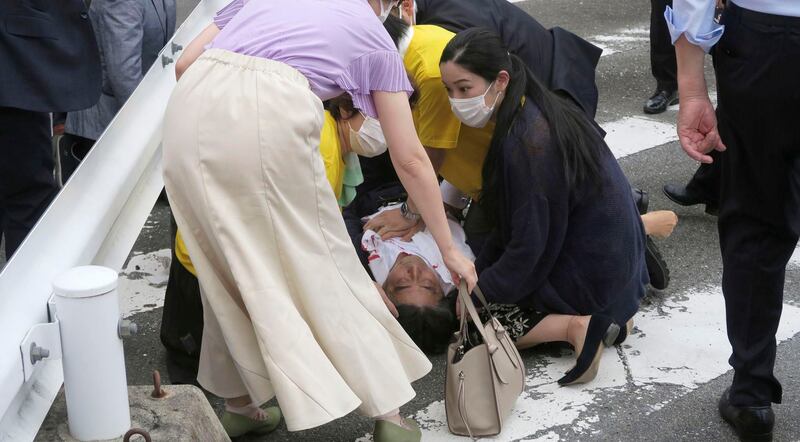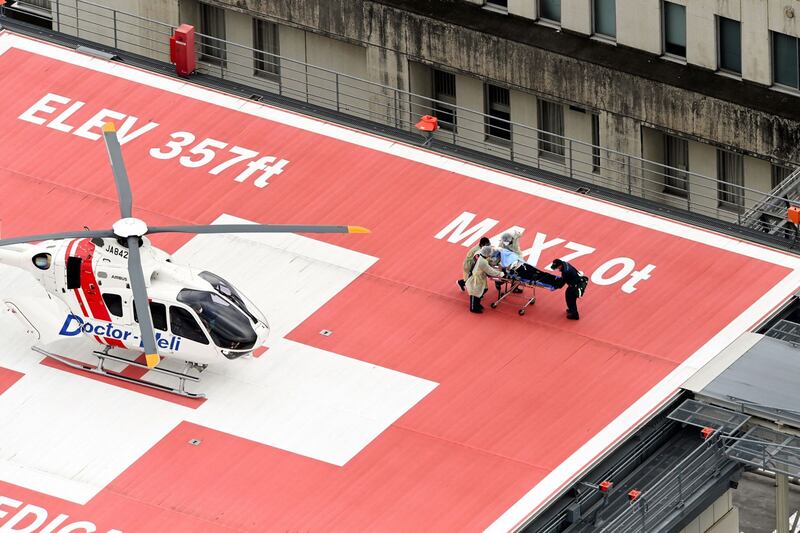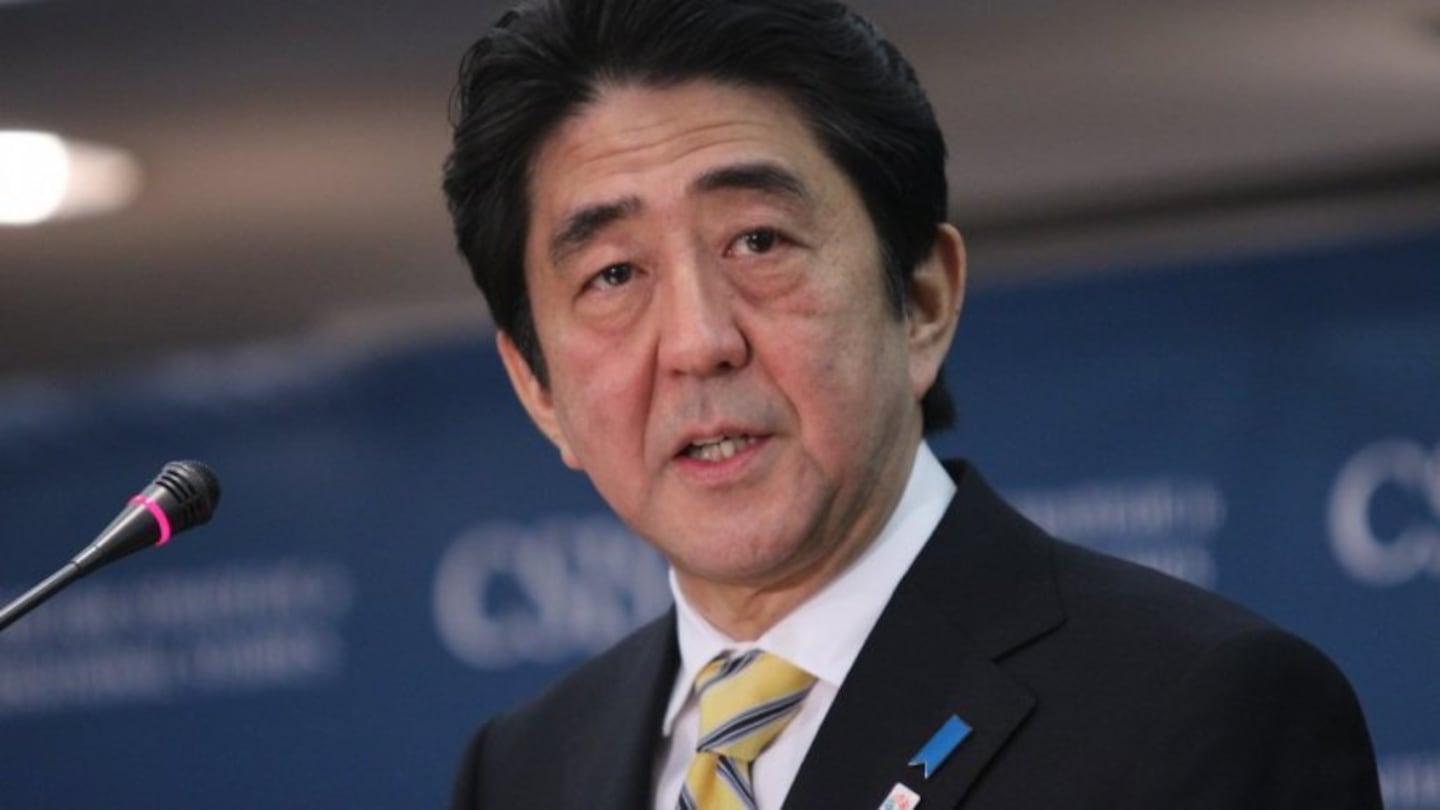Photo / Center for Strategic & International Studies
Japan's longest serving prime minister Shinzo Abe has died after being shot while campaigning for a candidate for the country's upcoming national elections.
Abe was delivering a speech for a Liberal Democratic Party politician Kei Sato, when less than one minute into his remarks two shots were fired in quick succession.
Social media video showed the 67-year-old fall to the ground.
The Japanese Fire and Disaster Management Agency says Mr Abe had been shot in his right neck and left chest.
Police arrested Tetsuya Yamagami, 41, on a charge of attempted murder, although it is expected this will be elevated to the higher charge of murder, with Mr Abe pronounced dead, shortly before 5 pm local time.

Japan's former Prime Minister Shinzo Abe, lies on the ground having been shot during a political rally in Nara, Japan Friday, July 8 / Kyodo News
Mr Abe was brought to Nara Medical University Hospital at 12:20 p.m. showing no vital signs.
Doctors gave blood transfusions and attempted to stop the bleeding but Hidetada Fukushima, the professor in charge of emergency medicine, said the 67-year-old could not be resuscitated.
Mr Abe served two terms, from 2006 to 2007 and from 2012 to 2020. He resigned in 2020 due to ill health.
Prime Minister Jacinda Ardern has joined a chorus of world leaders mourning the loss of the country’s longest-serving prime minister.
“New Zealand sends our condolences to Japan at this time of profound grief and deep shock,” Jacinda Ardern said.
“This act of violence against Japan’s longest serving Prime Minister is unfathomable, and we stand with Japan in its condemnation of what has happened today.
“Mr Abe was one of the first world leaders I met when I became Prime Minister. He was always focused, thoughtful, and generous.
“I remember after our first bilateral meeting as we were waiting for an official photo, he leaned over to tell me he was sorry my cat had passed away. In the meetings we had in the years that followed, I saw a statesman, someone who helped usher through complex negotiations like the CPTPP, but I also saw someone who was kind.
“Mr Abe’s loss will be deeply felt by so many.

Former Japanese Prime Minister Shinzo Abe is taken on a stretcher to a helicopter after being shot in front of Yamato-Saidaiji Station in Nara, Japan on Friday, July 8 / Getty Images
“Japan is a very close friend of ours, and my recent visit to Tokyo emphasised to me the strength of our relationship, the connections between our people, and the values that we share. We stand together in support of our Japanese friends.
“My thoughts are with Shinzo Abe’s wife and family, and with the government and people of Japan. Our aroha, our love, is with you all,” Jacinda Ardern said.
Caretaker UK Prime Minister Boris Johnson echoed Ardern’s sentiments, calling the assassination "incredibly sad":
“His global leadership through unchartered times will be remembered by many. My thoughts are with his family, friends and the Japanese people. The UK stands with you at this dark and sad time.” Johnson said.
Former US President Donald Trump, who boasted a close relationship with the former prime minister, issued a statement sharing his shock at the shooting: “Absolutely devastating news that former Prime Minister Shinzo Abe of Japan, a truly great man and leader, has been shot… He was a true friend of mine and, much more importantly, America. This is a tremendous blow to the wonderful people of Japan, who loved and admired him so much.” Trump said.
A stunned Japan is still coming to terms with the death of a politician who remained their most recognisable political figure, despite stepping down nearly two years ago.
Gun crime in Japan is rare, with just 10 shootings that contributed to death, injury or property damage reported in 2021.
Before his August 2020 resignation, Abe was criticised for his handling of the COVID-19 pandemic but simultaneously credited with bringing the Olympics to Tokyo in 2021.
He will probably be remembered for "Abenomics", his strategy to beat Japan’s crippling deflation, which had plagued the country since the early 1990s.
He was well known for beefing up Japan's military, and becoming a founding member of the Quad (a strategic security dialogue between Australia, India, Japan, and the United States), in an effort to counter China’s growing economic clout and geopolitical dominance within the region.
Mr Abe is survived by his wife, Akie Abe; his mother, Yoko Abe; and his brothers Hironobu Abe, a chief executive at Mitsubishi Corporation and Nobuo Kishi, Japan’s defence minister.

